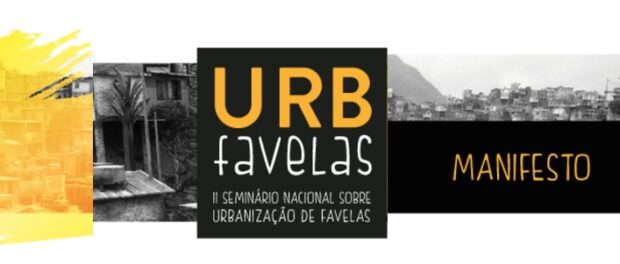
We, participants in the Second National Seminar on Favela Upgrading, held from November 23-26, 2016, in the city of Rio de Janeiro, understand that the urgency of Brazil’s current financial, fiscal, and economic situation threaten to undermine national public policy agendas.
We hereby express, in the context of the current political-institutional moment, our concern over the retreat from policies working to overcome sociological and geographic inequities, with special respect to those policies pertaining to Brazil’s favelas; land regularization; and affordable housing.
We hereby vehemently support the continuation of the struggle and final achievement of the goals as of yet only partially attained, in harmony with the Sustainable Development Goals and New Urban Agenda (Habitat III) recently adopted by the international community.
Whereas access to land and to dignified housing for all should be a transversal theme across public policy, any effective agenda to promote favela upgrading, as a basic component for turning cities and all human settlements into more just, democratic, equitable, and healthy spaces, must affirm the following as priorities:
- All governmental levels and bodies across the Brazilian federation should definitively abandon the policy of favela evictions and of the forced displacement of human populations.
- The National System for Housing in the Social Interest (SNHIS) and the regular flow of resources to the National Fund for Housing in the Social Interest (FNHIS) should be preserved and expanded as the responsibility of the State.
- The policy of favela upgrading should be integrated with those of land regularization, provision of adequate housing, technical assistance and improved quality housing, and restoration of damaged buildings, all in the context of Social Interest Housing.
- Land regularization (tenure) should be considered an essential component of urbanization and an indispensable element for realizing the right to housing, through administrative and juridical processes that recognize the specific uses of favela lands and lend viability to forms of urban regulation with the social and political support of favela residents.
- The participatory Municipal Master Plans should lay out clear directives for favela upgrading and the provision of social housing, with legally established targets and financing, defining location and adequate conditions of habitability. These should contemplate the occupation of vacant urban lots and areas bordering on low-income housing, with the aim of abiding by (laws, including Brazil’s Constitution, that emphasize) the social function of property, in juxtaposition to the further peripheralization of the low-income population.
- Favela upgrading policies should be accompanied by cross-sectoral public policies spanning the fields of education, health, culture, environment and leisure, with the purpose of overcoming Brazilian cities’ current social and territorial inequalities.
- State policy with respect to favela upgrading must include the ample and active participation of favela residents in the formulation, control and evaluation of plans, programs, projects, and works, guaranteeing the rights of said residents and avoiding flashy and superfluous projects which run counter to the interests of affected populations.
- Favela upgrading policies must undo long-established socio-spatial and symbolic inequalities, affirming as their ultimate goal the elimination of discretionary and discriminatory practices pertaining to these areas, and the guarantee of full and total access to human rights for their residents, alongside the provision and maintenance of urban infrastructure, equipment and services of equal or similar quality to those enjoyed by residents of other city neighborhoods.
